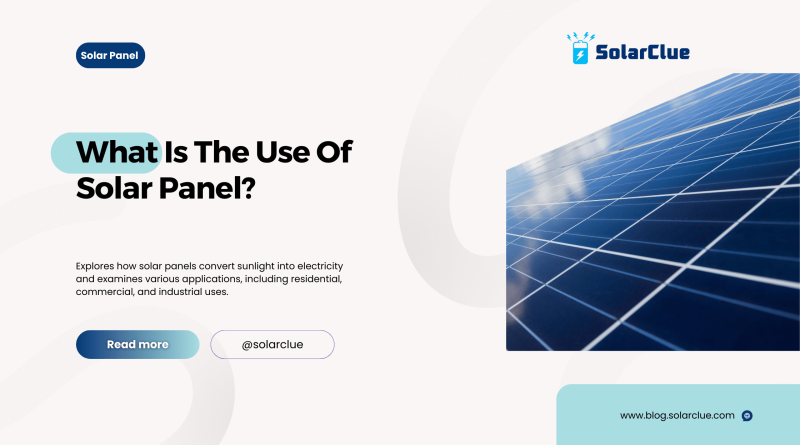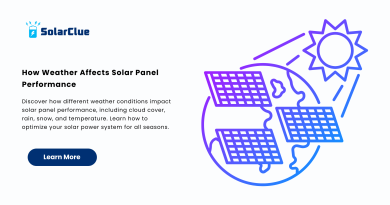What Is The Use Of Solar Panel?
Solar panels are a versatile and increasingly popular technology for harnessing clean, renewable energy from the sun. This blog explores how solar panels convert sunlight into electricity and examines various applications, including residential, commercial, and industrial uses. We’ll also discuss the benefits of solar energy and its role in combating climate change.
Table of Contents
- 1 How Solar Panels Convert Sunlight into Electricity
- 1.1 Solar Panels for Residential Homes
- 1.2 Uses:
- 1.3 Benefits:
- 1.4 Commercial and Industrial Solar Power Systems
- 1.5 Solar Power for Remote and Off-Grid Locations
- 1.6 Emerging Applications of Solar Energy
- 1.7 The Role of Solar Power in Combating Climate Change
- 1.8 The Future of Solar Energy and Its Potential Impact on Society
- 1.9 Conclusion
- 1.10 FAQ Section
How Solar Panels Convert Sunlight into Electricity
Solar panels consist of numerous solar cells, typically made from silicon, that capture sunlight and convert it into electricity through the photovoltaic effect. When sunlight hits the solar cells, it excites electrons, creating an electric current. This direct current (DC) electricity is then converted into alternating current (AC) by an inverter, making it suitable for use in homes and businesses.
Solar Panels for Residential Homes
Uses:
1. Electricity Generation: Solar panels can power household appliances, lighting, and electronic devices.
2. Net Metering: Excess energy generated can be fed back into the grid, providing credits or payments to the homeowner.
3. Battery Storage: Storing solar energy in batteries for use during nighttime or power outages.
Benefits:
- Cost Savings: Reduced electricity bills and potential income from net metering.
- Environmental Impact: Lower carbon footprint by using clean energy.
- Energy Independence: Less reliance on the grid and protection against rising energy costs.
Commercial and Industrial Solar Power Systems
Uses:
1. Electricity for Operations: Powering machinery, lighting, and office equipment.
2. Solar Carports and Canopies: Providing shaded parking and generating electricity.
3. Large-Scale Solar Farms: Generating significant amounts of electricity to power multiple facilities or sell to the grid.
Benefits:
- Cost Efficiency: Significant reduction in energy costs and potential tax incentives.
- Sustainability Goals: Meeting corporate sustainability targets and enhancing brand reputation.
- Energy Security: Reliable energy supply with less vulnerability to power outages.
Solar Power for Remote and Off-Grid Locations
Uses:
1. Rural Electrification: Providing electricity to remote villages and communities without access to the grid.
2. Off-Grid Homes and Cabins: Independent power systems for remote residences.
3. Disaster Relief and Emergency Power: Portable solar systems for use in disaster-stricken areas.
Benefits:
- Access to Power: Bringing electricity to areas without grid access.
- Cost-Effective: Avoiding the high costs of extending power lines to remote areas.
- Resilience: Reliable power in emergency situations.
Emerging Applications of Solar Energy
Solar Water Heating
- Uses: Heating water for residential, commercial, and industrial purposes.
- Benefits: Reducing energy costs and dependence on fossil fuels for water heating.
Solar Agriculture
- Uses: Powering irrigation systems, greenhouse heating, and crop drying.
- Benefits: Increasing agricultural productivity and sustainability.
Solar-Powered Transportation
- Uses: Charging electric vehicles (EVs) and powering solar buses and trains.
- Benefits: Reducing greenhouse gas emissions and dependency on fossil fuels.
The Role of Solar Power in Combating Climate Change
Solar power plays a crucial role in reducing greenhouse gas emissions and combating climate change. By replacing fossil fuels with clean, renewable energy, solar power helps lower carbon dioxide levels and other pollutants. It also contributes to a more sustainable energy system and supports global efforts to meet climate targets.
The Future of Solar Energy and Its Potential Impact on Society
The future of solar energy is promising, with advancements in technology, increased efficiency, and decreasing costs. Potential impacts include:
- Widespread Adoption: More households and businesses transitioning to solar power.
- Innovative Technologies: Development of more efficient solar cells, storage solutions, and integrated solar systems.
- Global Energy Transformation: Significant reduction in reliance on fossil fuels, leading to a cleaner and more sustainable energy landscape.
Conclusion
Solar panels offer a versatile and impactful solution for generating clean energy across various applications, from residential homes to large industrial complexes. The benefits of solar energy, including cost savings, environmental impact, and energy independence, make it an attractive option for a sustainable future. As technology advances and adoption increases, solar power will play an even more critical role in transforming our energy systems and combating climate change.
Here at SolarClue®, we offer a smart, practical, and “beautiful” solution. You will be answered for all the questions related to Solar.
We provide all kinds of brands that are the Best Solar panels in India.
If you are the one who is planning for the solar power system. Don’t hesitate to contact our team!
Looking forward to empowering you with solar energy, just like hundreds of our other clients!
FAQ Section
1. How do solar panels work?
Solar panels convert sunlight into electricity through the photovoltaic effect, where solar cells capture sunlight and create an electric current.
2. Can solar panels power my entire home?
Yes, depending on your energy needs and the size of your solar panel system, it is possible to power your entire home with solar energy.
3. What are the benefits of using solar power for businesses?
Businesses can benefit from reduced energy costs, meeting sustainability goals, and achieving greater energy security.
4. Is solar power viable for remote locations?
Yes, solar power is an excellent solution for remote and off-grid locations, providing reliable and cost-effective electricity.
5. What is the future of solar energy?
The future of solar energy looks promising, with advancements in technology leading to increased efficiency, lower costs, and wider adoption.



